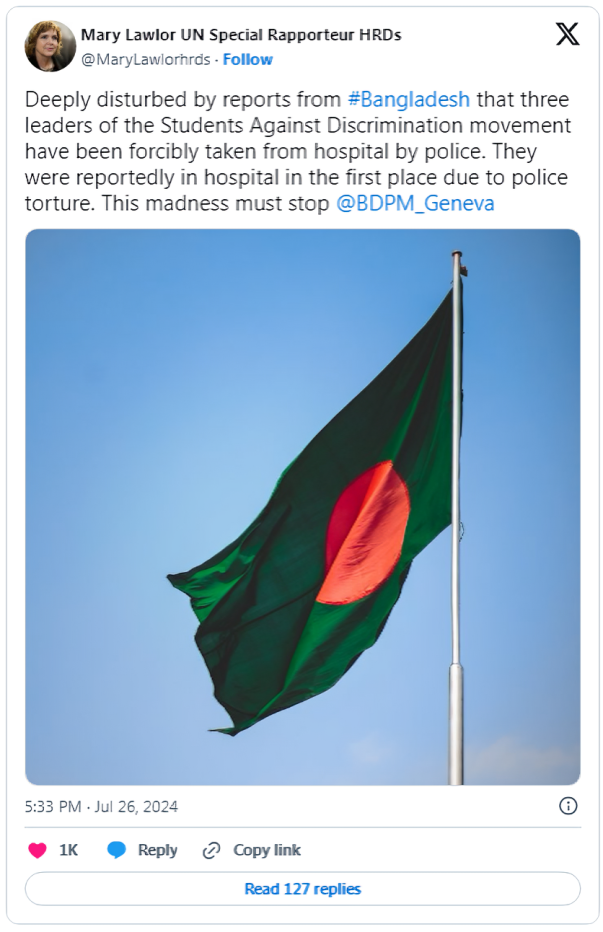Bangladesh Officials Arrest Student Protest Leaders at a Hospital
In a dramatic turn of events that has further inflamed the already volatile situation in Bangladesh, three prominent student leaders who spearheaded protests against government job quotas have been taken into custody from a hospital in Dhaka. This development follows deadly nationwide demonstrations, state-imposed curfews, and communication blockades that have gripped the nation.
Nahid Islam, Abu Bakar Mazumdar, and Asif Mahmud, key figures in the Students Against Discrimination movement, were reportedly forcibly discharged from the Gonoshasthaya Kendra hospital in the capital on Friday. Initially, police denied any involvement in their removal, but Home Minister Asaduzzaman Khan later provided a cryptic explanation, stating, "They themselves were feeling insecure. They think that some people were threatening them."
While Khan stopped short of confirming formal arrests, he added, "We think for their own security they needed to be interrogated to find out who was threatening them. After the interrogation, we will take the next course of action." This ambiguous statement has raised concerns about the students' well-being and the motives behind their detention.
The incident took a more sinister turn as security forces also apprehended a ward boy from the hospital and confiscated mobile phones belonging to Islam's mother and wife, as well as those of Mazumdar and Mahmud. These actions occurred shortly after an Al Jazeera team attempted to interview the student leaders, only to find their rooms cordoned off.

This latest development is part of a broader crackdown that has seen at least 150 people killed and thousands arrested since the protests turned violent last week. What began as peaceful demonstrations against a quota system reserving 30 percent of government jobs for families of independence war veterans has escalated into a broader movement challenging the government's authority.
The Supreme Court's recent decision to scale back the job reservation to 7 percent, making 93 percent of positions merit-based, did little to quell the unrest. Student leaders have since expanded their demands to include a public apology from Prime Minister Sheikh Hasina and the dismissal of police officers, multiple ministers, and university chiefs implicated in the violent crackdown.
As the government struggles to maintain control, it has implemented a series of restrictive measures. While the curfew has been gradually relaxed and limited internet connectivity restored, many restrictions remain in place. The ongoing unrest has further strained Bangladesh's economy, already grappling with high inflation and youth unemployment.
Mohammad Arafat, Bangladesh's minister of state for information and broadcasting, attempted to deflect responsibility by suggesting that "third-party" actors, including "extremists and terrorists," were fueling the unrest. However, this claim has been met with skepticism from international observers.
The United Nations High Commissioner for Human Rights, Volker Turk, has called for an independent investigation into alleged human rights violations, noting that many people "were subjected to violent attacks" by government-affiliated groups. A separate group of UN experts has echoed this call, emphasizing the need for a thorough examination of what they termed a "violent crackdown on protesters" by the government.
As Bangladesh teeters on the brink of further instability, the detention of these student leaders marks a critical juncture. Their fate could determine whether the country moves towards reconciliation or deeper into crisis. With international eyes firmly fixed on Bangladesh, the government's next moves will be crucial in shaping the nation's future and its standing on the global stage.
The coming days are likely to be pivotal, as protesters, government officials, and international observers alike wait to see how this latest development will influence the trajectory of Bangladesh's ongoing political and social upheaval.
-
16:30
-
16:20
-
16:12
-
16:00
-
15:50
-
15:41
-
15:30
-
15:20
-
15:00
-
14:50
-
14:31
-
14:30
-
14:20
-
14:00
-
13:50
-
13:30
-
13:20
-
13:12
-
13:00
-
12:50
-
12:45
-
12:30
-
12:20
-
12:15
-
12:03
-
12:00
-
11:50
-
11:45
-
11:30
-
11:25
-
11:20
-
11:00
-
10:50
-
10:30
-
10:20
-
10:00
-
10:00
-
09:50
-
09:50
-
09:30
-
09:20
-
09:10
-
09:00
-
08:50
-
08:33
-
08:30
-
08:20
-
08:00
-
07:50
-
07:40
-
07:20
-
07:00
-
18:50
-
18:30
-
18:20
-
18:00
-
17:50
-
17:30
-
17:20
-
17:00
-
16:50


